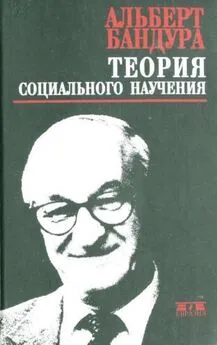Альберт Бандура - Теория социального научения
- Название:Теория социального научения
- Автор:
- Жанр:
- Издательство:Евразия
- Год:2000
- Город:Санкт-Петербург
- ISBN:5-8071-0040-9
- Рейтинг:
- Избранное:Добавить в избранное
-
Отзывы:
-
Ваша оценка:
Альберт Бандура - Теория социального научения краткое содержание
Мы представляем отечественному читателю первый перевод на русский язык базового сочинения известнейшего ученого Альберта Бандуры, стоящего у истоков социально-когнитивного направления в психологической науке.
В «Теории социального научения» автор систематически излагает обоснованные предположения о том, что поведение человека регулируется сложными взаимодействиями внешних и внутренних факторов: социальные процессы оказывают на поведение ни чуть не меньшее влияние, чем когнитивные.
Классическая бехевиористская формула «стимул — реакция» опосредуется внесением социальных и когнитивных процессов.
http://fb2.traumlibrary.net
Теория социального научения - читать онлайн бесплатно полную версию (весь текст целиком)
Интервал:
Закладка:
Gerbner G., & Gross L. «Living with Television: The Violence Profile». Journal of Communication, 1976, 26: 173–199.
Gerst M. S. «Symbolic Coding Processes in Observational Learning». Journal of Personality and Social Psychology, 1971, 19: 7-17.
Gewirtz J. L., & Stingle K. G. «Learning of Generalized Imitation as the Basis for Identification». Psychological Review, 1968, 75: 374–397.
Glynn E. L. «Classroom Applications of Self-Determined Reinforcement». Journal of Applied Behavior Analysis, 1970, 3:123–132.
Goldfried M. R., & Merbaum M. (Eds.), Behavior Change through Self-Control. New York: Holt, Rinehart & Winston, 1973.
Gray V. «Innovation in the States: A diffusion Study». American Political Science Review, 1973, 4: 1174–1185.
Greene D. Immediate and Subsequent Effects of Differential Reward Systems on Intrinsic Motivation in Public School Classrooms. Unpublished doctoral dissertation, Stanford University, 1974.
Grings W. W. «The Role of Consciousness and Cognition in Autonomic Behavior Change». In F. J. McGuigan and R. Schoonover (Eds.), The Psychophysiology of Thinking. New York: Academic Press, 1973.
Grose R. F. «A Comparison of Vocal and Subvocal Conditioning of the Galvanic Skin Response». Unpublished doctoral dissertation, Yale University, 1952.
Gutkin D. С «The Effect of Systematic Story Changes on Intentionality in Children's Moral Judgments», Child Development, 1972,43:187–195.
Harris F. R., Wolfe M. M., & Baer D. M. «Effects of Adult Social Reinforcement on Child Behavior». Young Children, 1964, 20: 8-17.
Harris M. В., & Evans R. C. «Models and Creativity». Psychological Reports, 1973, 33: 763–769.
Hart B. M., & Risley T. R. «Establishing Use of Descriptive Adjectives in the Spontaneous Speech of Disadvantaged Preschool Children». Journal of Applied Behavior Analysis, 1968, 1: 109–120.
Hastorf A. H. «The 'Reinforcement' of Individual Actions in a Group Situation». In L. Krasner & L. P. Ullmann (Eds.), Research in Behavior Modification. New York: Holt, Rinehart & Winston, 1965.
Hatano G. «Subjective and Objective Cues in Moral Judgment». Japanese Psychological Research, 1970,12: 96-106.
Hayes K. J., & Hayes C. «Imitation in a Home-raised Chimpanzee». Journal of Comparative and Physiological Psychology, 1952, 45: 450–459.
Hefferline R. F., Bruno L. J. J., & Davidowitz J. E. «Feedback Control of Covert Behaviour». In K. Connolly (Ed.), Mechanisms of Motor Skill Development. New York: Academic Press, 1970.
Herbert E. W., Gelfand D. M., & Hartmann D. P. «Imitation and Self-Esteem as Determinants of Self-Critical Behavior». Child Development, 1969, 40: 421–430.
Hernandez-Peon R., Scherrer H., & Jouvet M. «Modification of Electric Activity in Cochlear Nucleus during 'Attention' inUnanesthetizedCats». Science, 1956, 23: 3 3 1 -332.
Herrnstein R. J. «Method and Theory in the Study of Avoidance». Psychological Review, 1969, 76: 49–69.
Hicks D. J. «Girls' Attitudes toward Modeled Behaviors and the Content of Imitative Private Play». Child Development, 1971,42:139–147.
Hildebrant D. E., Feldman S. E., & Ditrichs R. A. «Rules, Models, and Self-reinforcement in Children». Journal of Experimental Psychology, 1960, 60: 97-102.
Hinde R. A., & Hinde-Stevenson J. Constraints on Learning. New York: Academic Press, 1973.
Horn G. «Electrical Activity of the Cerebral Cortex of the Unanesthetized Cat during Attentive Behavior». Brain, 1960, 83: 57–76.
Hughes С, Tremblay М., Rapoport R. N.. & Leighton A. H. People of Cove and Woodlot: Communities from the Viewpoint of Social Psychiatry. New York: Basic Books, 1960.
Jackson B. «Treatment of Depression by Self-Reinforce-ment». Behavior Therapy, 1972, 3: 298–307.
Jeffery R. W. «The Influence of Symbolic and Motor Rehearsal on Observational Learning». Journal of Research In Personality, 1976, 10: 116–127.
Jeffrey D. B. «A Comparison of the Effects of External Control and Self-Control on the Modification and Maintenance of Weight». Journal of Abnormal Psychology, 1974, 83: 404–410.
KanferK. H., & Marston A. R. «Determinants of Self-Reinforcement in Human Learning». Journal of Experimental Psychology, 1963, 66: 245–254.
Kaufman A., Baron A, & Kopp R. E. «Some Effects of Instructions on Human Operant Behavior». Psychonomic Monograph Supplements, 1966, 1: 243–250.
Kaye K. «Learning by Imitation in Infants and Young Children». Paper presented at the meeting of the Society for Research in Child Development, Minneapolis, 1971.
Kazdin A. E. «Covert Modeling, Model Similarity, and Reduction of Avoidance Behavior». Behavior Therapy, 1974a, 5: 325–340.
Kazdin A. E. «Comparative Effects of Some Variations of Covert Modeling». Journal of Behavior Therapy and Experimental Psychiatry, 1974b, 5: 225–232.
Kazdin A. E. «Effects of Covert Modeling and Reinforcement on Assertive Behavior». Journal of Abnormal Psychology, 1974c, 83: 240–252.
Kazdin A. E. «Covert Modeling, Imagery Assessment, and Assertive Behavior». Journal of Consulting and Clinical Psychology, 1975, 43: 716–724.
Kelman H. С. «Violence Without Moral Restraint: Reflections on the Dehumanization of Victims and Victimizers». Journal of Social Issues, 1973, 29: 25–61.
Kemp J. C, & Dale P. S. «Spontaneous Imitations and Free Speech: A Grammatical Comparison». Unpublished manuscript, Florida State University, 1973.
Kennedy T. D. «Verbal Conditioning Without Awareness: The Use of Programmed Reinforcement and Recurring Assessment of Awareness». Journal of Experimental Psychology, 1970, 84: 484–494.
Kennedy T. D. «Reinforcement Frequence, Task Characteristics, and Interval of Awareness Assessment as Factors in Verbal Conditioning Without Awareness». Journal of Exxperimental Psychology, 1971, 88: 103–112.
KohlbergL. «Stage and Sequence: The Cognitive-Developmental Approach to Socialization». In D. A. Goslin (Ed.), Handbook of Socialization Theory and Research. Chicago: Rand McNally, 1969.
Krane R. V., & Wagner A. R. «Taste Aversion Learning with a Delayed Shock US: Implications for the 'Generality of the Laws of Learning». Journal of Comparative and Physiological Psychology, 1975, 88: 882–889.
Kruglanski A. W. «The Endogenous-Eogenous Partition in Attribution Theory». Psychological Review, 1975, 82: 387–406.
Kurtines W., & Greif E. B. «The Development of Moral Thought: Review and Evaluation of Kohlberg's Approach». Psychological Bulletin, 1974, 8: 453–470.
Lefkowitz M.; Blake R. R.; & Mouton J. S. «Status Factors in Pedestrian Violation of Traffic Signals». Journal of Abnormal and Social Psychology, 1955, 51: 704–705.
Lepper M. R., & Greene D. «Turning Play into Work: Effects of Adult Surveillance and Extrinsic Rewards on Children's Intrinsic Motivation». Journal of Personality and Social Psychology, 1975, 31: 479–486.
Lepper M. R., Greene D., & Nisbett, R. E. «Undermining Children's Intrinsic Interest with Extrinsic Reward: A Test of the 'Overjustification' Hypothesis». Journal of Personality and Social Psychology, 1973, 28: 129–137.
Lepper M. R., Sagotsky J., & Mailer J. «Generalization and Persistence of Effects of Exposure to Self-Reinforcement Models». Child Development, 1975, 46: 618–630.
Leventhal H. «Findings and Theory in the Study of Fear Communications», In L. Berkowitz (Ed.), Advances in Experimental Social Psychology. New York: Academic Press, 1970.
Lidz Т., Cornelison A., Terry D., & Fleck S. «Intrafamilial Environment of the Schizophrenic Patient; VI; The Transmission of Irrationality». AMA Archives of Neurology and Psychiatry, 1958, 79: 305–316.
Liebert R. M., Neale J. M., & Davidson E. S. The Early Window: Effects of Television on Children and Youth. New York: Pergamon Press, 1973.
Lippitt R. R., Polansky N., & Rosen S. «The Dynamics of Power». Human Relations, 1952, 5: 37–64.
Locke E. A. «Toward a Theory of Task Motivation and Incentives». Organizational Behavior and Human Performance, 1968, 3: 157–189.
Locke E. A., Cartledge N., & Knerr, C. S. «Studies of the Relationship between Satisfaction, Goal Setting, and Performance». Organizational Behavior and Human Performance, 1970, 5: 135–158.
Loeb A., Beck А. Т., Diggory J. C, & Tuthill R. «Expectancy, Level of Aspiration, Performance, and Self-Evaluation in Depression». Proceedings of the 75th Annual Convention of the American Psychological Association, 1967, 2: 193–194.
Lovaas O. I. «A Behavior Therapy Approach to the Treatment of Childhood Schizophrenia». In J. P. Hill (Ed.), Minnesota Symposia on Child Psychology (Vol. 1). Minneapolis: University of Minnesota Press, 1967.
Luria A. The Role of Speech in the Regulation of Normal and Abnormal Behavior. New York: Liveright, 1961.
McArthur L. Z., & Eisen S. V. «Achievements of Male and Female Storybook Characters as Determinants of Achievement Behavior by Boys and Girls». Journal of Personality and Social Psychology, 1976, 33: 476–473.
Mahoney M. J. Cognition and Behavior Modification. Cambridge, Mass.: Ballinger, 1974.
Mahoney M. J., & Bandura A. «Self-Reinforcement in Pigeons». Learning and Motivation, 1972, 3: 293–303.
Mahoney M. J., & thoresen С. Е. Self-control: Power to the Person. Monterey, Calif: Brooks/Cole, 1974.
Mann M. E., & Van Wagenen R. K. «Alteration of Joint Mother-Child Linguistic Styles, Involving Procedures of Extension, Elaboration, and Reinforcement». Paper presented at the biennial meeting of the Society for Research in Child Development, Denver, April 1975.
Marks I. M., & GelderM. G. «Transvestism and Fetishism: Clinical and Psychological Changes during Faradic Aversion». British Journal of Psychiatry, 1967, 113: 711–729.
Marmor J. «Psychoanalytic Therapy as an Educational Process: Common Denominators in the Therapeutic Approaches of Different Psychoanalytic 'Schools» In J. H. Masserman (Ed.), Science and Psychoanalysis (Vol. 5, Psychoanalytic Education). New York: Grune & Stratton, 1962.
MarstonA. R. «Imitation, Self-Reinforcement, and Reinforcement of Another Person». Journal of Personality and Social Psychology, 1965, 2: 255–261.
Martin M., Burkholder R., Rosenthal T. L., Tharp R. G.; & Thome G. L. «Programming Behavior Change and Reintegration into School Milieu of Extreme Adolescent Deviates», Behaviour Research and Therapy, 1968, 6: 371–383.
Читать дальшеИнтервал:
Закладка:










